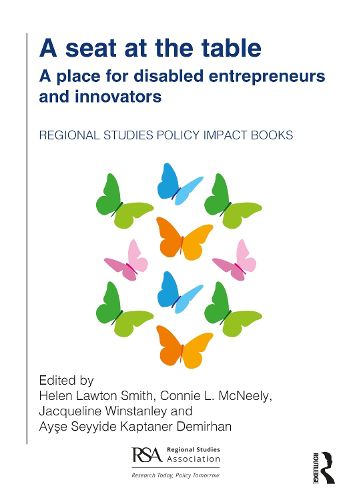Readings Newsletter
Become a Readings Member to make your shopping experience even easier.
Sign in or sign up for free!
You’re not far away from qualifying for FREE standard shipping within Australia
You’ve qualified for FREE standard shipping within Australia
The cart is loading…






In today's innovation-driven global economy, there is much to be learned from the lived experience of disabled entrepreneurs in respect of support, be it by governments, charitable organisations, professional bodies or universities. Addressing the ongoing problem of inequality in access and opportunities unites all these entities. The issue this book addresses is how the innovation and entrepreneurship created by disabled people are variously supported in different national contexts. What influences the availability of resources in support of entrepreneurship and innovation by disabled people - and what works?
Representative country case studies in this publication are India, Nigeria, Hungary, the United States and Tuerkiye. The book also draws on previous research in the UK. These countries illustrate the variations in how research into entrepreneurship undertaken by disabled people is focused on key national and regional issues. The contributions provide a summary and critique of existing legislative and policy approaches. These are detailed examples, but they are not unique and 14 different non-European countries have been identified where research on innovative entrepreneurs with disabilities has been undertaken. These include Brazil, China, Ecuador, Indonesia, Nepal and South Africa.
In this Policy Expo the authors consider how inequalities in participation, access and opportunity are addressed in different countries and regions. They consider the design and implementation of policies in support of disabled entrepreneurs in order to provide an impetus to include and improve larger entrepreneurship and innovation systems. The country chapters provide an analysis and critique of current national and policy provisions and also address overall socioeconomic benefits, beyond those of the individual. Examples are given of the experiences of disabled entrepreneurs to illustrate these points.
$9.00 standard shipping within Australia
FREE standard shipping within Australia for orders over $100.00
Express & International shipping calculated at checkout
In today's innovation-driven global economy, there is much to be learned from the lived experience of disabled entrepreneurs in respect of support, be it by governments, charitable organisations, professional bodies or universities. Addressing the ongoing problem of inequality in access and opportunities unites all these entities. The issue this book addresses is how the innovation and entrepreneurship created by disabled people are variously supported in different national contexts. What influences the availability of resources in support of entrepreneurship and innovation by disabled people - and what works?
Representative country case studies in this publication are India, Nigeria, Hungary, the United States and Tuerkiye. The book also draws on previous research in the UK. These countries illustrate the variations in how research into entrepreneurship undertaken by disabled people is focused on key national and regional issues. The contributions provide a summary and critique of existing legislative and policy approaches. These are detailed examples, but they are not unique and 14 different non-European countries have been identified where research on innovative entrepreneurs with disabilities has been undertaken. These include Brazil, China, Ecuador, Indonesia, Nepal and South Africa.
In this Policy Expo the authors consider how inequalities in participation, access and opportunity are addressed in different countries and regions. They consider the design and implementation of policies in support of disabled entrepreneurs in order to provide an impetus to include and improve larger entrepreneurship and innovation systems. The country chapters provide an analysis and critique of current national and policy provisions and also address overall socioeconomic benefits, beyond those of the individual. Examples are given of the experiences of disabled entrepreneurs to illustrate these points.